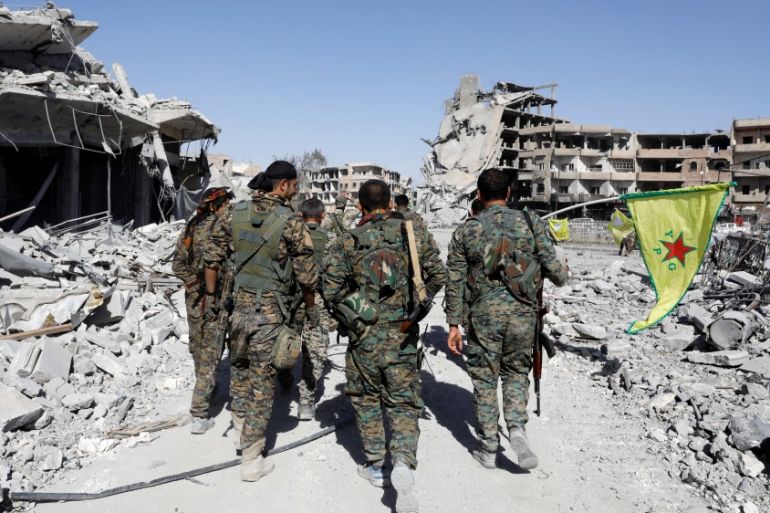Who will pay for the reconstruction of Raqqa?
Those who destroyed Raqqa seem unwilling to pay for its reconstruction.

The Syrian Democratic Forces (SDF) celebrated winning the battle for Raqqa by recreating the “tank doughnuts” that ISIL did when they seized the city back in 2014. They also secured access for the international media to document that the black flag has been taken down and that the Islamic State of Iraq and the Levant (ISIL) is no more. What these journalists saw in Raqqa was utter urban destruction on a scale unseen in recent history, worse even than that of west Mosul or eastern Aleppo. Initial estimates suggest that some 1,800 civilians died in the battle and the Syrian Observatory for Human Rights estimates that over 80 percent of the city has been damaged or destroyed. All of Raqqa’s prewar population of 300,000 Syrians had fled.
So what next for this beleaguered city and who will bear the responsibility for its future?
According to the monitoring group Air Wars, US-led forces dropped 5,775 bombs, shells and missiles in Raqqa in August alone. Such was the intensity of the attacks that the UN even made the rare call for operations to be eased.
The use of explosive weapons in densely populated areas have devastating effects and, unfortunately, Raqqa is a clear illustration of that. Raqqa’s electricity and sewage systems have been destroyed, its schools and hospitals decimated. If residents were to return they would find no clean drinking water, no markets, no life as it was before. Those who were in the city during the intensive bombardment will suffer from disabilities and mental health damage for years to come.
But Raqqa residents cannot yet think of returning because those responsible for destroying it do not seem that willing to foot the bill for its reconstruction.
Back in March US Secretary of State Rex Tillerson warned that while his country has led operations against ISIL, stabilisation and reconstruction will “require more from all of you”. There can be little argument that, in this particular corner of Syria, the Colin Powell doctrine of “you break it, you own it” will be applied. Yet, it will be ridiculous to see the US and its allies willing to spend $13.6m a day to bomb ISIL, but unwilling to spend a dime on reconstruction efforts in those iconic cities that have been “liberated”.
Another problem is that it is still unclear how Raqqa will be governed. The UN secretary-general, Antonio Guterres, has called on parties to the conflict to use the fall of the city to restart stalled attempts to find a political process forward. The SDF has boldly asserted that Raqqa will be part of a decentralised federal Syria, but with the conflict forever unpredictable and with forces loyal to the Syrian regime only some 15km away, it would seem hard to make concrete plans for reconstruction. What is more, while the SDF has repeatedly promoted itself as a mixed Arab-Kurdish force, their raising of a giant banner of Kurdish leader Abdullah Ocalan has already led to concerns about how the new authority plans to govern the city.
In terms of practicalities, it may be easier, safer and cheaper to rebuild a new Raqqa next to the old one rather than attempting the laborious and dangerous task of removing explosives, rubble and contaminated materials from the current site. Whatever strategy is adopted it is not going to be cheap and the SDF have already called for the international community to stump up for its costs.
Interestingly, reports have suggested that Saudi officials have already visited Raqqa and promised that the country will play a “prominent” role in its reconstruction. Other members of the US-led coalition should also be stepping up and demonstrating the required international leadership and ownership of Raqqa’s future, otherwise, the former ISIL capital could become another Middle East “ghost city”, symbolic of the absence of a post-ISIL vision.
Earlier this year the UN Humanitarian Chief described the battle for Mosul as “hell on earth” and early estimates of repair costs easily top $1bn “just to restore water, electricity, sewage and schools”. As with past post-conflict planning, much hope for resources for Mosul and the other post-ISIL cities in Iraq has been placed on the upcoming Kuwait donor conference in 2018.
Raqqa is more complicated as there is no agreement to restore Syrian state authority over the city which remains dependent on the uncertainty as to how the conflict concludes. Yet without the coming together of global players at a conference or moment that can unite around a vision for Raqqa, as well as provide the critically needed funds and urban planning expertise, the concern is that the destroyed city will remain in limbo with most of its residents counting time living in refugee camps.
The people of Raqqa have witnessed and paid the ultimate price for years of conflict, occupation and displacement. Today the city, its people and its politics are at a crossroads that will determine if the former capital of the ISIL “Caliphate” can be reborn and restored or whether it will be doomed to decades of neglect.
The views expressed in this article are the author’s own and do not necessarily reflect Al Jazeera’s editorial policy.
